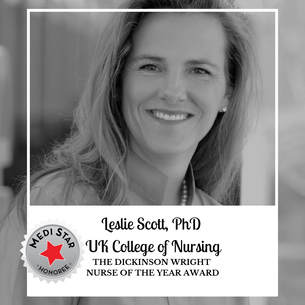 Originally posted by The MediStar Awards Leslie Scott, PhD received her undergraduate degree in nursing from Gardner Webb University and a Master of Science in Nursing from the University of Kentucky. She completed her doctorate degree in nursing, also from the University of Kentucky. Scott is an associate professor in the College of Nursing, where she serves as coordinator for both the primary care and acute care, Pediatric Nurse Practitioner tracks in their BSN-DNP program. She is a board certified, primary care pediatric nurse practitioner with almost 30 years' experience as a Certified Diabetes Educator. Her clinical practice is in the pediatric clinic at the Barnstable-Brown Diabetes Center. She has provided diabetes care and education to children throughout Kentucky for almost 25 years and has volunteered as a nurse/nurse practitioner at Kentucky’s Diabetes Camp for Children, Inc. (Camp Hendon) for more than 20 years. Describe your philosophy on your role as a nurse and the impact you have on patient care. I think the primary role of a pediatric nurse is to empower children and families to learn and master the skills needed to foster normal growth & development and optimize health. Growing up having a mother with type 1 diabetes, I witnessed the daily struggles and long-term complications associated with developing this complex, chronic disease as a child. I want to encounter a generation of children who do not have the same struggles in managing their diabetes. Through education, support, and advocacy I strive daily to change the lives of children and families who battle the day-to-day challenges of managing type 1 diabetes during childhood and adolescence. Fortunately, I learned early in my nursing career that incorporating knowledge of childhood growth & development into the individualized education needs of the child with diabetes is key to their learning the self-care, management skills needed for optimal daily diabetes control. What steps have you taken to improve the quality of care for the patient community? Prior to 2014, there were children in Kentucky with type 1 diabetes prohibited from attending school or participating in school-related functions, if their school nurse was not available to administer insulin on a particular school day. Unfortunately, not every school in Kentucky has a school nurse. One advocacy effort gave me an opportunity to provide information to the Kentucky Legislative Research Commission (LRC) describing the inequities in access to safe education experienced by school-age children with diabetes. The findings reported by the Kentucky LRC provided fundamental information that endorsed legislative changes in the provision of school health services. During the legislative process, I was able to advocate on behalf of school-age children through efforts such as speaking to the Practice Committee at the Kentucky Board of Nursing, addressing the Kentucky Legislature in support of HB 98/SB 30, and serving on the School Advocacy Professional Panel for the American Diabetes Association. How will the results of this initiative impact the healthcare community? Kentucky legislative efforts lead to the amendment of two regulatory statutes in 2014, resulting in changes to the provision of school health services for children with diabetes in Kentucky schools. These legislated changes allowed insulin administration by trained, unlicensed school personnel in the absence of a school nurse. This one endeavor has probably been the most impactful change to improve care and access to a safe education for children with diabetes in Kentucky schools. Through these changes, more school personnel are trained to care for children with diabetes rather than relying exclusively on the school nurse or parent to provide diabetes-related care at school. Having more school personnel knowledgeable about diabetes care improves support and safety in school for all children with diabetes. What accomplishments are you most proud of and how did it impact your patient(s)? Numerous opportunities have arisen during my nursing career. I have been fortunate to be able to expand from my role as diabetes educator to a role in developing the next generation of pediatric care providers. Because of my development of the primary care and acute care pediatric nurse practitioner (PNP) tracks within our BSN-DNP program, I have been able to merge clinical practice with teaching and mentoring of future pediatric care providers. Through my service with Kentucky’s Diabetes Camp for Children Inc., I have been able to provide an immersion experience for PNP students. Having a better understanding of the complexity of diabetes management in children may develop a more competent, compassionate provider. While I enjoy observing nurses develop advanced practice skills, witnessing a child grow, develop, and learn to self-manage their diabetes is an amazing experience. I am grateful for the opportunity to be a part of that experience.
0 Comments
Your comment will be posted after it is approved.
Leave a Reply. |
Archives
February 2022
|
QuestionPro provides unparalleled insights and just launched enterprise features including Communities, Customer Experience, Workforce and Mobile

 RSS Feed
RSS Feed

